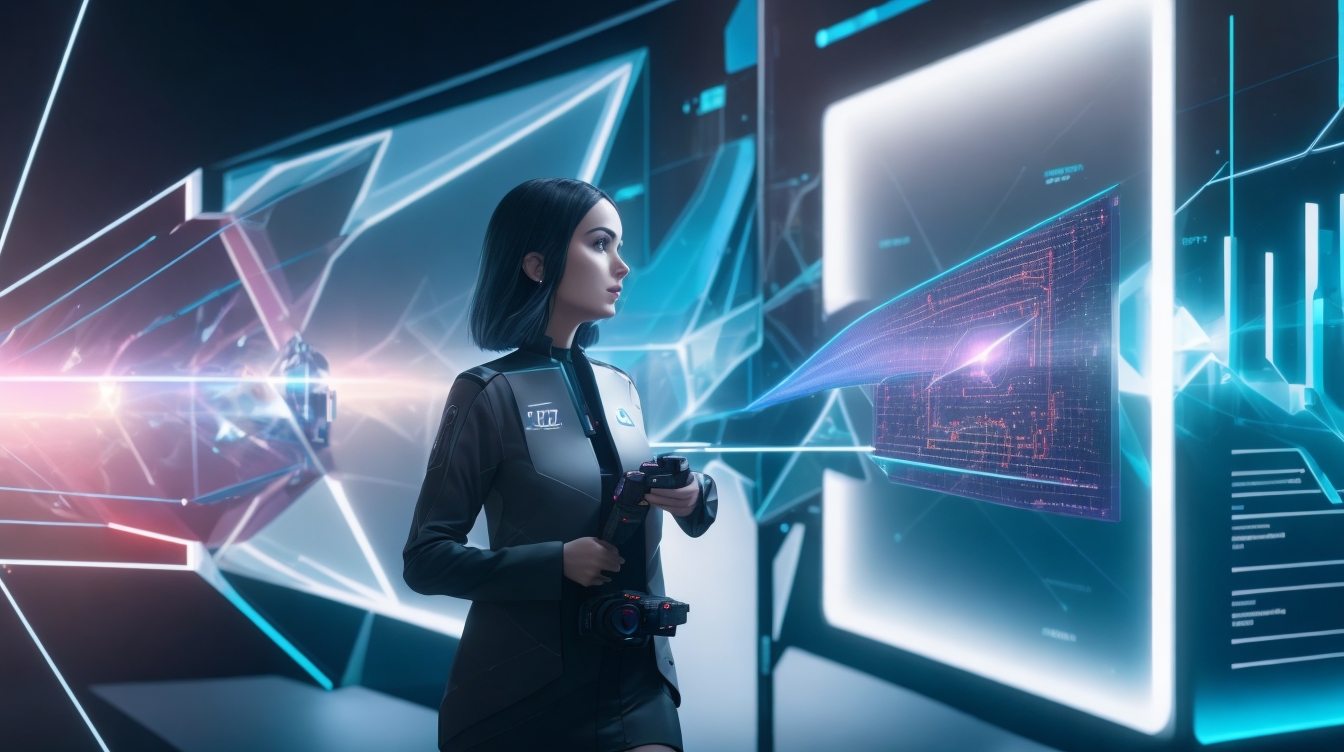AI for Content Optimisation
Unlocking the potential of artificial intelligence (AI) has transformed various industries, and content creation is no exception.
AI has become an invaluable tool in the quest for content optimisation, revolutionising the way we create, personalise, and deliver engaging content to our audiences.
In this article, we will embark on a captivating journey through the vast landscape of AI for content optimisation, exploring the role of AI in content creation, the ethical implications it raises, real-world examples of its successful implementation, and the future trends that await us.
The Role of AI in Content Creation
Imagine a world where your content creation process is elevated to new heights with the help of AI. Embracing AI technologies can enhance every aspect of content creation, from generating topic ideas to fine-tuning the finished product.
How AI Enhances Content Creation
AI acts as an intuitive co-pilot, augmenting human creativity and productivity by streamlining and automating various tasks. By leveraging natural language processing (NLP) algorithms, AI can assist in keyword research, content ideation, and even generate compelling headlines.
Benefits of AI in Content Creation
Using AI for content creation offers numerous benefits. It can save valuable time by automating repetitive tasks and reducing the manual effort required.
Additionally, AI-powered tools can analyze vast amounts of data to provide actionable insights for improved content performance. It enables content creators to experiment with personalisation, dynamic micro-segmentation, and multi-channel content delivery.
AI Tools for Content Optimisation
In the world of content optimisation, AI tools have emerged as trustworthy companions, empowering content professionals to maximize their impact. Let’s take a closer look at some popular AI tools available for content optimisation, comparing their features and functionalities.
Overview of AI Tools for Content Optimisation
SEMrush, MarketMuse, and other AI tools have gained recognition as efficient content optimisation assistants.
These powerful tools offer a range of capabilities, including keyword research, topic clustering, content gap analysis, and AI-generated content suggestions.
Comparison of Popular AI Tools
When selecting an AI tool for content optimisation, it’s essential to consider their specific functionalities, pricing structures, and user-friendliness.
We’ll compare and contrast the strengths of popular AI tools, helping you make an informed decision that aligns with your content optimisation goals.
How to Choose the Right AI Tool for Your Needs
Selecting the right AI tool for your content optimisation strategy can be daunting. We’ll offer practical insights and suggestions to guide you in choosing an AI tool that best suits your requirements, considering factors such as budget, scalability, and integration capabilities.

Ethical Implications of AI in Content Optimisation
As AI rapidly transforms the content landscape, it raises important ethical questions that must be considered.
We must balance the immense power of AI with the need for transparency, privacy, and fairness in content optimisation.
Potential Ethical Concerns
AI-powered content optimisation may give rise to concerns such as algorithmic biases, data privacy, and the potential for AI-generated content to mimic human voices.
We’ll explore these critical ethical considerations and discuss strategies to address them.
Balancing AI and Privacy in Content Optimisation
Respecting user privacy is crucial in the age of AI-driven personalisation. We’ll delve into the importance of implementing responsible data practices, obtaining informed consent, and embracing privacy-preserving AI techniques to strike the right balance between AI-powered optimisation and data protection.
The Future of AI in Content Optimisation
The exciting possibilities of AI for content optimisation lie not only in improving current practices but also in shaping the future of content delivery.
Let’s gaze into the crystal ball and explore the predicted trends in AI for content optimisation.
Predicted Trends in AI for Content Optimisation
As AI continues to evolve, personalisation, voice search, visual search, and multilingual content will play increasingly significant roles in content optimisation strategies. We’ll discuss how AI can revolutionise these areas and explore the implications for content creators.
Real-World Examples of AI in Content Optimisation
There’s no shortage of success stories when it comes to AI-powered content optimisation. We’ll examine real-world case studies of companies that have effectively implemented AI in their content strategies, highlighting the valuable lessons we can learn from their experiences.
Case Studies of Companies Successfully Using AI for Content Optimisation
From e-commerce giants to media companies, several organisations have harnessed the power of AI for content optimisation with remarkable results. We’ll look at specific case studies, dissecting their strategies and outcomes to glean insights for our own content optimisation journeys.
Lessons Learned from Real-World Implementations
Implementing AI for content optimisation can be a transformative process. We’ll examine the challenges and triumphs faced by real-world organisations, distilling the lessons learned along the way. By understanding these experiences, you can navigate your own path towards successful AI integration.

Getting Started with AI for Content Optimisation
Ready to embark on your own AI-powered content optimisation adventure? We’ll provide you with a step-by-step guide to implementing AI in your content strategy, ensuring a smooth and successful integration.
Step-by-Step Guide to Implementing AI in Your Content Strategy
We’ll break down the process of incorporating AI into your content strategy into manageable steps. From strategic planning to selecting AI tools and training your team, we’ll guide you through the entire journey, making sure you’re well-prepared for success.
Tips for Successful AI Integration in Content Optimisation
Integrating AI effectively requires thoughtful planning and execution. We’ll share valuable tips and best practices to help you navigate potential challenges and ensure a seamless integration of AI for content optimisation.
The Limitations of AI in Content Optimisation
While AI offers immense potential, it’s essential to recognise its limitations. We’ll explore the boundaries of AI in content optimisation and the importance of balancing AI with human input to preserve the human touch in content creation.
Understanding the Limitations of AI
AI is a powerful tool, but it’s not infallible. We’ll examine the limitations of AI in content optimisation, including its inability to replace human creativity, context understanding, and the subjective nature of certain content elements.
The Importance of Balancing AI with Human Input in Content Creation
AI should be harnessed as a valuable ally rather than a replacement for human expertise. We’ll discuss the critical role that human input plays in content creation and the ways in which humans can collaborate with AI to achieve the best results.
Conclusion
As AI continues to redefine the world of content optimisation, embracing its potential becomes crucial for content creators.
By leveraging AI tools and techniques, we can enhance our content creation processes, unlock new levels of personalisation, and create impactful experiences for our audiences. The future of content optimisation belongs to those who dare to embark on the AI-powered journey, using it as a compass to navigate the ever-evolving content landscape and deliver exceptional content that resonates with their target audience.
Future Perspectives on AI and Content Optimisation
The possibilities AI holds for content optimisation are boundless. As technology advances and new opportunities emerge, we must stay attuned to the future of AI in content optimisation. By staying ahead of the curve, we can continue to create content that captivates, educates, and inspires, always keeping our audience at the heart of our content strategies.

AI and User Experience
Artificial Intelligence isn't just changing the fabric of content creation; it's also revolutionizing the user experience in content consumption.
Personalisation with AI
AI uses machine learning to understand user behavior, preferences, and interests. It consequently personalises the content to make it more suitable and enjoyable for individual consumers.
AI and Recommendation Systems
Recommendation systems powered by AI are used widely across content platforms. These systems interpret user behaviour to suggest additional relevant and appealing content.
Adaptive Content with AI
AI can deliver 'adaptive content', which refers to content that changes dynamically based on the user's behaviour, tastes, and past interactions.
AI and Content Distribution
AI plays a pivotal role in the distribution and promotion of content, making it more targeted, smart, and effective.
Social Media Algorithms and AI
Social media platforms use AI algorithms to determine which posts are most relevant to display to each user based on their behaviour and interaction with similar content.
AI and Programmatic Advertising
AI has propelled a shift towards programmatic advertising, where AI algorithms buy and sell ad space in real-time based on an individual's specific demographic, behaviour and interests.
AI and Content Analytics
AI significantly enhances content analytics, delivering deeper insights and enabling data-driven strategies for content optimisation.
Analyzing Content Performance with AI
AI can sift through vast amounts of data to judge the performance of a piece of content, suggesting improvements based on user engagement and response.
Understanding User Behaviour with AI
AI can comprehend user behavior on a much granular level. It helps uncover patterns and trends that provide critical insight to creators.
AI-Driven Insights for Content Optimisation
Learning from the data, AI can offer invaluable, actionable insights that assist in creating more engaging, effective content.
AI and Voice Search Optimisation
With voice search on the rise, AI is at the heart of optimisation strategies for this growing platform.
Impact of AI on Voice Search
AI's ability to understand and process natural language has led to the rise of digital voice assistants like Alexa, Siri, and Google Assistant.
Optimising Content for Voice Search with AI
Content optimisation for voice search involves using long-tail keywords and adopting a more conversational tone in content, strategies that AI can aid in devising.
AI and Visual Content Optimisation
AI is also transforming the way we optimise visual content, leading to higher engagement and superior SEO performance.
Optimising Images and Videos with AI
AI can help optimise images and videos through improved tagging, better SEO descriptions, recognition of visual patterns and preferences in images and videos.
AI and Multilingual Content Optimisation
In our increasingly globalized world, AI plays an integral role in optimising content for multiple languages.
Role of AI in Multilingual Content Optimisation
AI can break the language barrier by translating and optimising SEO of content in several languages, essentially improving accessibility and reach.

AI Automation Agency Services
AI is now being incorporated in agency services to automate various tasks and processes that were traditionally manual and time-consuming.
Role of AI in Automation Agency Services
AI is automating tasks like content creation, keyword research, and link-building, speeding up operations and improving efficiency. It also enhances reporting and analyses, providing deeper insights into campaign performance.
Benefits of AI Automation Agency Services
With AI, agencies can offer more competitive, efficient, and data-driven services. It frees human marketers to focus on strategy and creativity, while AI handles the more routine tasks.
AI and Authority Websites
Authority websites, which are considered reputable and trustworthy by both users and search engines, are also finding value in AI.
Using AI to Build Authority Websites
AI can help in building authority websites by identifying trending topics, generating keyword-rich content, and constantly optimizing for SEO. It can also enhance user experience through smart personalisation.
Benefits of AI for Authority Websites
AI can help these websites maintain their authoritative status by consistently delivering high-quality, optimized content that aligns with user expectations and SEO guidelines.
AI and Social Media Posts
AI is making a significant mark on social media as well, transforming how posts are created, shared, and promoted.
Creating Social Media Posts with AI
AI can create engaging social media posts, tailor content to suit each platform's unique requirements, and even determine the best time to post for maximum engagement.
Promotion of Social Media Posts with AI
AI tools can also target specific audience segments and determine which posts to promote, helping to stretch advertising budgets.
AI-Driven Feature Images
AI isn't just changing the text content; it's also transforming how we create and optimise visual content such as feature images.
Creating Feature Images with AI
AI tools can create feature images for blogs, articles, and websites, ensuring they are well-optimized for SEO.
Optimising Feature Images with AI
AI tools analyse several aspects of the image – its relevance to the content, the emotional response it might trigger, its uniqueness and even its colours, ensuring it is optimised for visibility and engagement.
AI and Apps
From personal tasks to professional workflows, AI-driven apps are transforming our digital experiences.
AI-Driven Apps for Content Creation and Optimisation
AI apps like Google Docs' AI typing assistant and Grammarly's writing assistant are making content creation more accurate and efficient. They assist with spell checks, grammar, clarity, engagement, delivery, and even plagiarism – making the content optimised and ready-to-publish.
Benefits of AI-Driven Apps
AI-driven apps make tasks easier and more efficient. They provide personalised recommendations, automate mundane chores, and offer insights that drive smarter decision-making. Whether it's spell-checking a report or scheduling social media posts, AI-driven apps are making work simpler and more productive.

FAQs
How is AI transforming content creation and optimisation?
AI is drastically improving the content creation and optimisation process. It can automate mundane tasks such as keyword research, SEO optimisation, and link building. AI aids in identifying trending topics, creating engaging and personalised content, and ensuring it is well-optimised for search engine algorithms. It can analyse significant amounts of data to understand user behaviour, giving insights into improving user experience and content efficacy.
What are some popular AI tools for content optimisation?
Some of the widely used AI tools for content optimisation include SEMrush, MarketMuse, Moz, and Frase. SEMrush excels at SEO including keyword research and backlink audits, while MarketMuse shines for its capability to identify content gaps and offer recommendations. Moz offers comprehensive SEO toolset with an excellent site crawling feature, and Frase focuses on optimising content based on user intent.
Can AI replace human input in content creation?
While AI has made great strides in the content creation process, it can’t replace the human touch. AI aids in automating and enhancing several aspects of content creation but it still struggles with understanding human emotions, creativity, and cultural nuances that only a human creator can provide. Therefore, the ideal content strategy should involve a balance of AI and human input.
How is AI impacting voice search and visual content optimisation?
AI has greatly impacted voice search and visual content optimisation. Digital voice assistants like Alexa, Google Assistant, and Siri are products of AI, creating a need for content optimisation for voice search. This involves the use of long-tail keywords and a more conversational tone in content. In visual content optimisation, AI can identify patterns and preferences in images and videos, helping to tag and describe visual content effectively for SEO.
How does AI enhance user experience in content consumption?
AI enhances the user experience by personalising content consumption. It uses machine learning to understand user behaviour and tailor content accordingly. From recommendation systems suggesting relevant content, to adaptive content that changes in real-time based on user interaction, AI is leveraging data to provide a more engaging, individualised content consumption experience.


